Governance, Democratization and Commoning
“You mustn’t think of the commons world as a land of milk and honey, but as a picnic to which everyone contributes.” (Silke Helfrich)
Representative democracies are in crisis. Many people in Western societies are frustrated by politics and many people are excluded from elections because they lack the “right” citizenship. In the Solidary Mode of Living, all people should have the opportunity to shape their lives and everything that touches them in a self-determined way. This requires profound social changes and the dismantling of hierarchies.
In this context, democratization also means redistribution. Access to participation is as much about time and emotional capabilities as it is about education and material and social security. In addition, it requires appropriate decision-making procedures that counteract power inequalities and enable all people to participate equally. However, the right to not always have to stand up for one’s rights with all of one’s might (because one cannot or does not always want to) must be preserved.


Moreover, currently democratic participation extends only to a few areas of society, and economic activities are largely excluded from it. The Imperial Mode of Living organizes the distribution of goods through private property and profit maximization. In a Solidary Mode of Living, people can use goods according to their needs without violating the needs of others.
The latter is reflected in the Principles of Commons. Classic Commons are jointly used land or jointly shared knowledge, for example, on platforms such as Wikipedia. However, it is not the good itself that determines whether something is a Commons, but how it is used: Commons are created when those involved produce, maintain and use them collectively. They are, therefore, always social. Commons also always come along with an orientation towards needs and follows the principle of contributing instead of exchanging.
Featured image from: Helfrich, Silke, Bollier, David (2019): “Frei, fair und lebendig – die Macht der Commons”. Bielefeld: Transcript Verlag. Illustration by Mercè M. Tarrés.
Microlearnings




